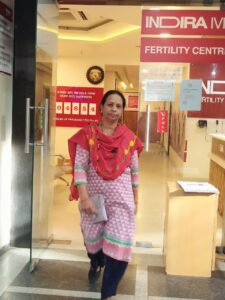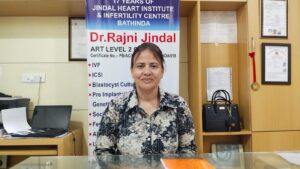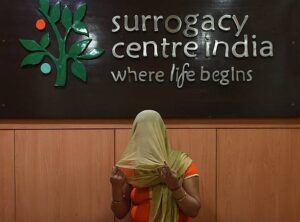The amendments to the Surrogacy Regulation Act 2021 have benefitted women who opt to become surrogate mothers and the children born out of these arrangements. The law has ensured their safety and well-being. The changes in the law have opened the door to the commercialisation of surrogacy while demarcating the legal rights and regulations of surrogate mothers, children, and intending parents.
Surrogacy allows individuals or couple to fulfil their dream of having babies through a third person, who agrees to carry and deliver the baby for them. The woman is known as the surrogate mother, and the couple intending to opt for surrogacy are the intended parents.

Surrogacy is a blessing for middle-aged women who visit IVF centres for treatment. Above is a photo grab of a woman visiting an IVF centre in Nagpur, Maharashtra. (Photo Rashmi Mohite)

Dr Rajni Jindal from Bathinda, Punjab, runs a surrogacy centre and has been dealing with IVF for more than two decades. (Photo by Megha Mann)
Dr Rajni Jindal, a gynaecologist running a government-registered surrogacy clinic in Bathinda, Punjab, appreciates the changes as the rules now safeguard the interests of everyone involved in a surrogacy arrangement. There are several checks to ensure surrogacy centres across the country comply with the rules of the land. All surrogacy centres must register with the state government and check their papers regularly. “This has come as a welcome step for a sector that has largely remained unorganised for a long time and went unchecked in cases in places like Anand in Gujarat where surrogacy was a booming business,” says Jindal.
Jindal refers to ‘Anand’, the city in Gujarat that has earned the ‘Milk Capital of India’ moniker. Over the past few years, the city has also become known for its thriving medical centres, which provide surrogacy options to both Indian and international clients.
However, the new amendments in the law have ensured that surrogacy is not just a business proposition that can be misused for profit. It is now mandatory for couples to prove that a woman cannot get pregnant or has already undergone multiple fertility treatments with zero success rates. Previously, without regulatory checks, only the contracts made by lawyers or surrogacy clinics determined the parties’ rights.

The intending couple needs to approach the government
The new amendments have made it mandatory for the intending couple first to select a doctor or a surrogate mother and complete the formalities for seeking surrogacy. This entails a dossier of documents that also mentions details of the surrogate mother, who should be related to the couple. The couple gives an affidavit pledging that no money would exchange hands for the surrogacy and that they would take care of the mother for a certain period. All applications are forwarded to the District Level Surrogacy Boards under the ambit of the Civil Surgeon of the district concerned. District Medical Board then studies the application and interviews the intending couple and the surrogate mother before forwarding the application to the state-level board.
 Lawyer Anubha Rastogi has authored two books, ‘The Little Handbook on the PCPNDT Act’ and ‘Claiming Dignity: Compilation of Judgments affecting Reproductive rights of Women’.
Lawyer Anubha Rastogi has authored two books, ‘The Little Handbook on the PCPNDT Act’ and ‘Claiming Dignity: Compilation of Judgments affecting Reproductive rights of Women’.
Need for submission of medical proof
Anubha Rastogi, a lawyer from Delhi and author of books The Little Handbook on the PCPNDT Act and Claiming Dignity: Compilation of Judgments Affecting Reproductive Rights of Women, explains that before the amendment, surrogacy could be initiated using the donor’s egg or sperm alone irrespective of any medical complication that stopped the couple from giving one of their own eggs or sperm or not. The new rule states that only one gametes can come from a donor. Now, married couples can use donor eggs and sperm on the condition that there is medical proof to support that need. The law allows cases wherein reports of medical complications are certified by a district magistrate court. Another update is the mandatory filling of a form taking the consent of the surrogate mother in agreement.

National ART & Surrogacy Registry
The Department of Health Research, under the Ministry of Health and Family Welfare (Govt. of India), is collecting data on the National Assisted Reproductive Technology (ART) & Surrogacy Registry, which will be an online public record system of ART clinics/banks and surrogacy clinics in India. Dr Jindal explains the significance of this work being done by the department, saying, “This national registry will act as a central database of all the ART clinics, banks and surrogacy clinics in the country having all kinds of details. It shall also identify the number of times a woman has become a surrogate mother. This particular data will help doctors identify such cases where a surrogate mother may be opting for surrogacy on a commercial basis.”
Altruistic surrogacy vs commercial surrogacy:
The law now prohibits the commercialisation of surrogacy by introducing an altruistic perspective. According to this theory, the surrogate should be genetically related to the intended couple. The only payments allowed are the expenses for medical procedures, medical insurance, etc. According to Rastogi, this will also help eliminate the previous taboos and stigma associated with surrogacy. “I think now it will become far more closed in that sense because it (surrogacy) will be only with someone you know and in exceptional circumstances. I also think the amount of paperwork, procedures, and certification required now will dissuade people from opting for surrogacy,” adds Rastogi.
Dr Jindal echoes Rastogi’s thoughts, adding that due to the amount of paperwork and documentation required, not many states are now granting permissions for surrogacy. Government employees involved in granting permissions are a little wary and insist on completing all formalities before giving permissions. With the law being new, many want to avoid setting bad precedents by granting wrong permissions.

Debate about discriminations
Since the introduction of the changes, there has been a growing debate on the new surrogacy laws restricting individual rights. Several district panels have received complaints that challenge the law. The complainants say the new rule restricts their right to parenthood. Dr. Jasbir Singh Aulakh, the civil surgeon of the industrial city Ludhiana (Punjab) and the head of the district Ludhiana board, says such cases have been forwarded to the state-level body for review. Permissions have yet to come in as the state has requested more proof and other supporting documents from the intended parents.
The new changes in the law have excluded certain sections like LGBTQ couples or same-sex couples who may want to have children through surrogacy. Such exclusions come across as being restrictive and very concerning. “A law shouldn’t have such a narrow view, especially of parenthood, of family or of who constitutes a family because this excludes a large section of the population who also have the right to be parents,” says Rastogi.
Identifying loopholes in the law
Until the new amendments, cross-border surrogacy arrangements exploited differences in surrogacy laws between India and other countries, with the new laws that are set to change for the better. However, according to Rastogi, things will continue evolving for some time. Citing the impact of the governmental ban on sex determination and sex selection of the foetus in the country since 1995, she says that over the years, people have managed to find loopholes and conducted these tests to find out the gender of the foetus in countries where there is no such ban. Similarly, in the case of surrogacy laws, some loopholes may come to the fore and could be exploited. Since the implementation is nascent, these loopholes would take another year to become public.
Surrogacy in ancient India
Indian mythology bears testimony of one of the first surrogacy cases reported in ancient India. A research paper published in the International Journal of Sanskrit Research, 2023, titled “The unique birth of Sri Balarama: A scientific study and analysis in the modern medical context” by Dr. Kodati Vijaya Lakshmi, a Research Scholar at the Karnataka Sanskrit University, Bengaluru, Karnataka, India, points out to the scientific evidences regarding surrogacy available in the holy scriptures.
According to Mahabharat, Balarama, Devki’s seventh child, was mystically transferred from Devaki’s womb to Rohini’s womb. In due course of time, Balarama gave birth in Gokula. Therein lie the roots of surrogacy.
The Surrogacy Timeline:
1. March 2023: The Surrogacy Regulation Act of 2021 is amended by a gazette notification: It bans using donor gametes (donor eggs or sperm). Couples undergoing surrogacy can have only one of the gametes coming from a donor. The law states single women opting for surrogacy are to use their own eggs or their own eggs with the donor’s sperm.
2. January 2024: The Supreme Court stays the provision of the Surrogacy Act that does not allow the use of donor eggs. The apex court makes an exception to allow seven couples to undergo surrogacy with donor eggs after reviewing medical reports for these cases that confirm the women are unable to use their own eggs due to underlying medical conditions.
3. January 2024: The Central Government informs the Supreme Court it is reviewing the March 2023 amendment to the Surrogacy Regulation Act banning donor gametes.
4. February 2024: An amendment to the Surrogacy Regulation Act permits the use of donor gametes if one partner (of the couple) has a medical condition necessitating it. Cases requiring donor egg or sperm to be reviewed by the District Medical Board, which certifies the use of donor gametes in surrogacy.
Copy Editor: Dipta Joshi

